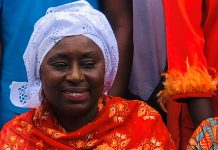The National Human Rights Commission (NHRC) has on Wednesday called on The Gambia Government to ratify and domesticate the Protocol to the African Charter on Human and Peoples Rights on the Rights of Older Persons in Africa which has been adopted by the African Union (AU) since January 31, 2016.
The rights commission made the plea ahead of the International Day of Older Persons, commemorated by the United Nations (UN) annually on 1st October,
International Day of Older Persons aims to raise awareness of the impact of an ageing population and the need to ensure that people can grow old with dignity and continue to participate in society as citizens with full rights. According to the UN, the number of older persons in the world will grow from about 600 million to almost 2 billion over the next 5 decades.
They said: “Today, one in ten persons is aged 60 or over. By 2050, this will be one person in five, and by 2150, one in three.”
“In The Gambia, it is estimated that about four percent of the population is above 65 years.” The Commission said this percentage is expected to increase to twelve percent by 2050 with an increase in life expectancy as a result of The Gambia’s modest growth in its human development profile. Thus, like many developing countries in Sub-Saharan Africa, The Gambia will face incredible challenges in the demands of its ageing population that will require more investment in primary health care and development of robust social security schemes. They added: “At present, The Gambia lacks basic social protection for older persons, such as specialized care, health insurance, a social safety net or minimum income support and residential care facilities where needed.”
According to the NHRC Commissioners, section 63 of the 2020 Draft Constitution was an attempt to ensure the rights of older persons to ‘fully participate in the affairs of society, pursue their personal development, live in dignity and respect and be free from abuse; and receive reasonable care and assistance from their family and the State’.
“Older persons are an integral part of the society. They are a repository of history and wisdom and the gate keepers of our value system. They make major contributions to society, particularly rural women who play an important role in the social fabric of communities.”
However, given the current status of older persons, the NHRC expressed deep concern over the lack of social protection for old people and therefore urged the Government to ensure that retirees are provided with minimum income security.





















